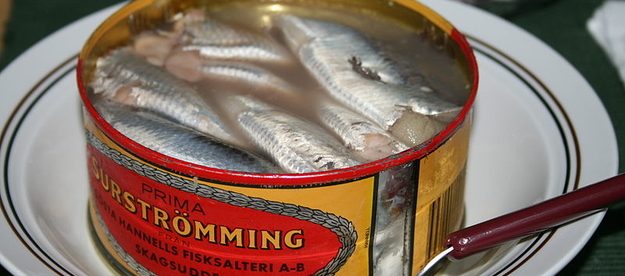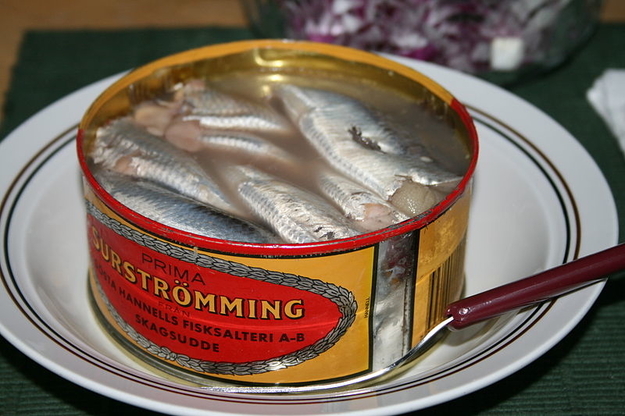The Surströmming Offensive

There are lots of advantages to living in an apartment building, sure, but there are also some disadvantages, too — you don’t get to pick your neighbors, and they may do things which affect your home. Maybe your upstairs neighbors have little kids who stomp around at six o’clock in the morning. Perhaps there’s someone a few floors below you who uses more hot water than the building could possibly provide. And maybe there’s a particularly pungent odor emanating from another apartment and wafting throughout the stairwells.
None of those, likely, are grounds for eviction, unfortunate as it may be. Not unless surströmming is involved.

Surströmming, pictured in its container above, is a Swedish delicacy — herring, canned in a brine, which is fermented for at least a few months before opening. And by all accounts, it smells absolutely awful. There are reports (likely tongue-in-cheek) that “birds began to drop dead from the sky” from the smell after barrels of the stuff are open. In another event, as The Local (a Swedish publication) reported, the smell of a gas leak prompted some people in Stockholm to call the authorities, “but when [fire and rescue] got to the scene and started to investigate the smell, one of the residents informed us that they were eating fermented herring, which turned out to be the cause.” And if you go to YouTube — and please, don’t do this if you have an easily triggered gag reflex — you’ll find lots of videos of people opening cans for the first time, only to be overwhelmed by the smell. In one such video, for example, a Buzzfeed reviewer compared the smell to “a national park bathroom that somebody just dumped a bunch of dog food in.”
Surströmming — it smells terrible.
And yet, people eat it. Typically, it’s eaten outdoors, far away from where the cans were open, and as part of a fish taco called surströmmingsklämma. It is not something one should ever eat in an apartment building — and especially not in a common area therein — unless you want to find yourself a new apartment.
We know that because in 1981, a German man living in an apartment went a little overboard with the surströmming. For reasons unclear (and probably malicious), he decided to not only open a can of the stench-ridden fish, but also decided to spread the malodorous brine in the stairwell he shared with the other residents. The result: the landlord sought to kick him out.
But the resident fought back, pushing the matter to a local landlord/tenant court. In general, those have a bias toward tenants — we don’t want to make people suddenly homeless — but surströmming is the great exception to the typical. At first, it looked like the court would rule against the landlord, but the petitioner had brought some evidence with him. According to a recap (.pdf, and in German) of landlord/tenant cases involving various disruptions, the landlord brought along a can of surströmming — and he opened it so the judge could have a first-hand experience of what it’s like to experience the fish’s smell in close quarters. And it worked: per the court (translated), “the chamber was able to confirm first-hand that the awful smell of the fish sauce far exceeds what could be considered tolerable for the other tenants.”
With that, the offending tenant’s lease came to an end.
Bonus fact: The term “red herring” probably also has to do with the scent of the fish. Per the online etymology dictionary, literal red herrings were “used by fugitives to put bloodhounds off their scent,” giving rise to the metaphorical meaning.
From the Archives: Fishing for Trouble: Herring, causing trouble in other ways.
